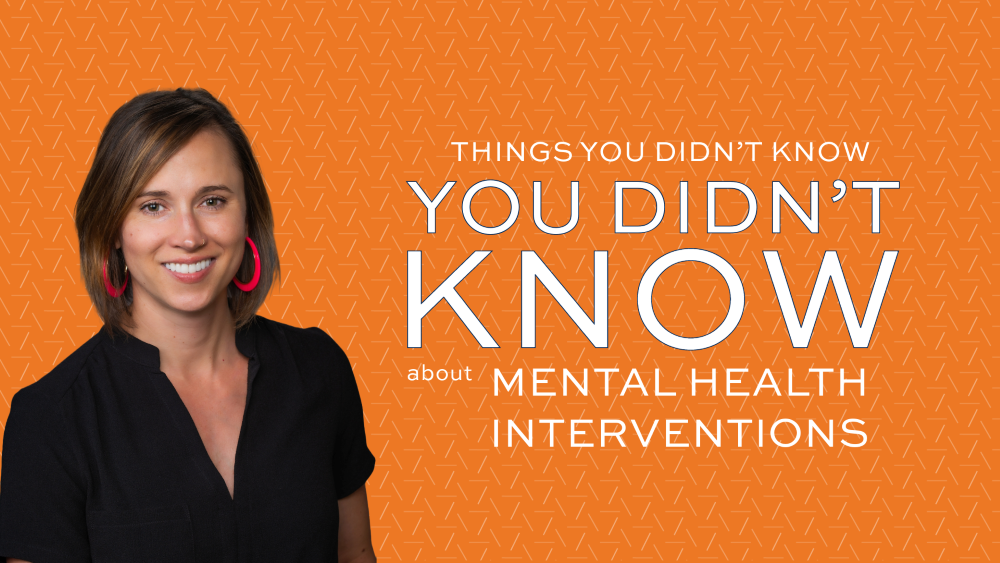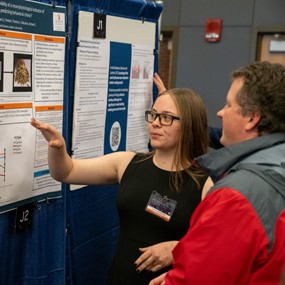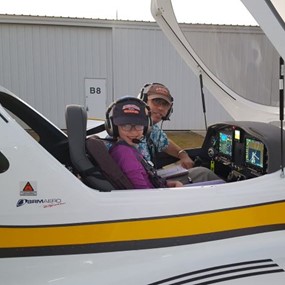'Things You Didn't Know You Didn't Know' about mental health interventions

Interoception is how we feel and understand internal sensations like hunger, pain or heart rate. Associate Professor April Smith is developing a new tool that targets interoception as an avenue to improve mental health. Her online intervention, Reconnecting to Internal Sensations and Experiences (RISE), has already shown success in active-duty service members and clinical patients and is currently being tested in college students and veterinarians.
What is interoception? How does it relate to mental health?
Interoception is the ability to be aware of internal sensations in your body, so things like your heart rate, your respiration, whether you're hungry or full, if you're feeling pain, your ability to sense temperature and, critically, your ability to feel emotion sensations.
Research is showing a strong link between interoception and mental health. You can either be too in touch with internal sensations, or you could be too out of touch with internal sensations, and that could be problematic. If you're overly focused on your heart rate, you might start to think you notice heart palpitations, and then maybe you get really anxious, and then maybe that leads to a full-blown panic attack. Conversely, the inability to recognize when you’re hungry or full, or pain sensations, could facilitate things like restrictive eating, binge-eating or self-injurious behaviors and put someone at risk for those mental health conditions.
What is the RISE intervention?
The RISE intervention stands for Reconnecting to Internal Sensations and Experiences. For a number of years, we were seeing time after time that people who had engaged in suicidal behavior had worse interoception than people who hadn't. So, we started to think if interoception is a risk factor for suicidality, we might be able to improve it and thereby reduce suicide outcomes.
At the time, some studies started to come out showing you could actually improve people’s ability to attend to things like their heart rate or breathing through relatively simple procedures. And we thought, okay, let’s try to build out an intervention that is really aimed at improving interoception, interoceptive awareness, and see if that might in turn impact downstream suicidality.
With the goal in mind of getting people connected to their bodies, increasing the care of their bodies, we have a number of exercises and some psychoeducation we provide people about interoception and mental health. We also have them do some self-guided reading and interactive writing prompts. There are some audio clips they can listen to and even some at-home worksheets where they can practice the skills that they’re learning.
From the outset, it was really important to us to design an intervention that could exist online and be self-guided. For every mental health clinician, there are literally tens of thousands of people suffering. There's just no world in which we're able to get all those people connected to in-person clinicians. So, our lab really wanted to think about accessible interventions.
How does RISE work?
In the first part of the intervention, after they learn about interoception, we teach them about all the muscle groups in the body. We then work with them on body functionality, which asks them to think about how their bodies perform and function and what their bodies can do, rather than thinking about their bodies just in appearance-based terms. We’re all really good about thinking about how our bodies are “too” this or “too” that, but we have kind of gotten away from thinking about what our bodies can do for us: how they help us hug a loved one or send a work email or play the piano.
In our second session, we have them do a lot of work around emotion recognition and management of emotions that may be associated with ineffective behaviors. We provide education on a variety of emotions, from good ones to maybe less desirable ones, and really get participants to think about how they feel those emotions in their body, where they feel them, how they maybe distinguish between anxiety versus anger and then how they might shift from an angry state to a calmer state, and we give them skills to practice that.
In our third session, we move to some more body functionality work where we have people think about how they can use their body in terms of communication, but also how they can use their bodies to engage in self-care, healing, resting, digesting, things like that. Then, we end with a module on being more aware of hunger and fullness sensations. We have participants learn about intuitive eating principles as well as engage in a mindful eating exercise.
Who benefits from the RISE intervention?
Interoception and being in touch with our bodies is a great skill to teach to anyone. I've benefited from it. Unfortunately, in our society and culture right now, there are a lot of forces pushing us to disconnect from our bodies, whether that be because we're dieting to try to look a certain way, or we're trying to push down or manage our emotions, or we are on social media and sort of taking this observer stance of our body. All of that could worsen interoception and then drive or potentially facilitate people being able to hurt their bodies, whether that be through eating disorder behaviors or substance use behaviors or self-injurious behaviors.
I would just encourage people, to the extent that they can, to think about things that they can do to get back in touch with their bodies or take an attitude of more care or regard toward their bodies, because it really does seem like that can lead to better mental health outcomes.
About the expert:
April Smith is an associate professor of psychological sciences at the College of Liberal Arts at Auburn University. She directs the Research on Eating Disorders and Suicidality (REDS) Lab and co-directs the Auburn Eating Disorders Clinic. Smith has received more than $6.5 million in funding from the Department of Defense and National Institute of Mental Health to support her work improving mental health outcomes.
Transcript
Brandon Etheredge:
Close your eyes, unless you're driving, that would be bad. But if not, close your eyes. Do you feel hungry? Can you feel your heart beating? How fast is your breathing? Do you feel pain or tension in your muscles? All of these things are related to Interoception, and today we're diving head first into how these little everyday feelings are connected to mental health. And we're talking about a new tool aimed at combating the growing mental health crisis in America. Welcome back to the Things You Didn't Know You Didn't Know Podcast. We're excited to kick off Season 6 with an amazing researcher, Dr. April Smith. She's an associate professor of Psychological Sciences at Auburn University and the Director of the Research on Eating Disorders and Suicidality Lab. Dr. Smith has received over 6.5 million in funding from the Department of Defense and the National Institute of Mental Health to support her work. She's a superstar and we're excited to have her on the show. Dr. Smith, welcome. Let's jump right in. What is Interoception?
April Smith:
Sure, sure. Interoception is the ability to be aware of internal sensations in your body, so things like your heart rate, your respiration, whether or not you're hungry or full, if you're feeling pain, your ability to sense temperature, and also critically your ability to feel emotion sensations.
Brandon Etheredge:
So a lot of your work focuses on mental health and improving mental health outcomes. How does Interoception relate to mental health?
April Smith:
So research is showing that there appears to be a really strong link between Interoception and mental health. And what we're seeing is that actually you can either be too in touch with internal sensations and that could be problematic, or you could be too out of touch with internal sensations and that could be problematic. And so some of the earliest research was actually looking at how people who are too aware of internal sensations, if you're overly focused on your heart rate, you might start to think you notice heart palpitations, and then maybe you get really anxious, and then maybe that leads to a full-blown panic attack. And so you can see how that increased awareness could be problematic. But more recently, and what our research has focused a bit more on is people who are really disconnected from internal sensations. So for example, an individual who doesn't recognize when they're hungry or doesn't recognize when they're full, or who has trouble recognizing pain sensations. We think that could actually facilitate things like restrictive eating or binge-eating or self-injurious behaviors and put them at risk for those mental health conditions.
Brandon Etheredge:
So let's talk about RISE. How did that come about?
April Smith:
Yeah, so the RISE intervention stands for Reconnecting to Internal Sensations and Experiences. And we had been doing work for a number of years where we were seeing time after time that people who had engaged in suicidal behavior thought about suicide. They had worse Interoception than people who hadn't. They were more disconnected from their bodies. And so we started to think, well, okay, if Interoception is this risk factor for suicidality, might we be able to improve it? But we didn't know if this was something we could actually manipulate. But at the time, some studies started to come out showing that you could actually improve people's ability to attend to things like their heart rate or their breathing through relatively simple procedures. And so we thought, okay, let's actually then try to build out an intervention that is really aimed at improving Interoception, interoceptive awareness, and see if that might in turn impact downstream suicidality.
Brandon Etheredge:
Now this is an intervention, so take me step by step through this. What does this look like for someone using the intervention?
April Smith:
Sure. So we actually did a number of pilot studies testing each component of the intervention. And so from the outset, it was actually really important to us to design an intervention that could exist online and be self-guided. And that's because we know that the realities are that for every mental health clinician, there are literally tens of thousands of people suffering. And so there's just no world in which we're able to get all those people connected to in-person clinicians. So our lab really wanted to think about accessible disseminable interventions. And so we wanted to, again, with the goal in mind of getting people connected to their bodies, increasing the care of their bodies, we have a number of exercises, so there's some psychoeducation. We provide people about Interoception and mental health. We also have them do some self-guided reading. They do some interactive writing prompts.
There are some audio clips that they can listen to and even some at-home worksheets where they can practice the skills that they're learning. And so in the first part of the intervention, after they learn about Interoception, we also teach them progressive muscle relaxation where they're really thinking about all the muscle groups in the body. We then work with them on something called body functionality, which asks them to think about how their bodies perform and function and what their bodies can do, rather than thinking about their bodies just in appearance-based terms. So we're all really good about thinking about how our bodies are maybe too slow or too old or too big or too this or too that. But we have kind of gotten away from thinking about what our bodies can do for us, how they help us hug a loved one or send a work email or play the piano. So that work on body functionality in the first session, we're getting people to think about it in that way and getting them to think about how their bodies can be used to engage in physical activities and creative activities.
Then in our second session, we actually have them do a lot of work around emotion recognition and also kind of management of emotions that may be associated with ineffective behaviors. And so we really provide a lot of education on a variety of emotions, from good ones to maybe less desirable ones, and really get participants to think about how do they feel those emotions in their body? Where do they feel them? How could they maybe distinguish between anxiety versus anger? And then also how might they be able to shift from an angry state to a more calm state, and we give them skills to practice that. Then in our third session, we actually move to some more body functionality work where we're having people think about how they can use their body in terms of communication. I'm moving my hands right now, I'm talking to you, but also how they can use their bodies to engage in self-care, healing, resting, digesting, things like that. And then we end with a module on being more aware of hunger and fullness sensations. And so we actually have participants learn about intuitive eating principles as well as engage in a mindful eating exercise.
Brandon Etheredge:
And you've done pilots in a few different populations, one of those being active duty service members. When you did those pilots with the servicemen and women, what did you find during that process?
April Smith:
Yeah, so we were really lucky to get to have some funding from the Department of Defense to do a grant, actually with Dr. Tracy Witte, also at Auburn University, where we recruited a sample of 195 active duty service members and veterans, and we randomly assigned them to either our RISE intervention or a comparator that was matched in terms of time and attention, and it just focused on more general healthy attitudes, or developing more healthy activities and attitudes. And what we found was that the people who received our RISE intervention actually showed improvements in six out of eight facets of Interoception. So improvements and things like being able to recognize emotions, being able to notice internal sensations, being able to listen to their bodies, being able to trust their bodies, and then really excitingly, we also found that those improvements by and large persisted at a one and a three-month follow up.
Brandon Etheredge:
And you also did pilot studies with students and veterinarians. Why were those populations so important?
April Smith:
With students? Unfortunately, we know that suicide is a second-leading cause of death in the student age group population, and we also know that mental health issues are being experienced at an unprecedented rate among students. And so we thought it was really important to see if our RISE intervention could actually help some of the mental distress that students are experiencing. And then in terms of veterinarians, yeah, this stems actually from work with my friend and colleague, Dr. Tracy Witte, who has been engaged in work looking at why veterinarians do have elevated rates of suicide. And what she's found in talking with veterinarians is that they actually get similar, it sounds like to me, training in some ways to people in the military where they're taught that when they're performing surgeries or euthanasias, they need to be able to turn off emotions or be able to ignore hunger sensations, bathroom sensations, pain sensations to get the thing accomplished. But the problem is then if they're not taught that they need to reconnect after these surgeries or procedures that could potentially be problematic. And so we're hoping to actually do some focus groups and adapt our intervention for their specific needs.
Brandon Etheredge:
Obviously, each of these populations are incredibly different. What makes RISE so adaptable that it can serve so many different types of people?
April Smith:
Interoception and being in touch with our bodies is a great skill to teach to anyone. I've benefited from it. And I think it's something that, unfortunately in our society and culture right now, there are a lot of forces that are pushing us to disconnect from our bodies, whether that be because we're dieting to try to look a certain way, or we're trying to push down or manage our emotions, or we are on social media and sort of taking this observer stance of our body. I just think there's a lot of forces at play that are leading a lot of people to be disconnected from their bodies, to be more critical of their bodies, to be less trustful of their bodies. And all of that I think then could drive or potentially facilitate people being able to hurt their bodies, whether that be through eating disorder behaviors or substance use behaviors or self-injurious behaviors. And so I think there's real benefit to the modules getting back in touch with your body that could really actually apply to almost anybody.
Brandon Etheredge:
Now, the goal here is for this to be an online intervention. Why is it important that this be online and accessible?
April Smith:
Yeah, as I mentioned there, just unfortunately, I think the state of mental health in America, really the world, is that I think we have to be thinking about different models of treatment. Although I really firmly believe in one-on-one psychotherapy and enjoy providing that, I can't treat everybody that needs help and all the therapists in the world can't treat everybody that needs help. And so I think it's really important to think about designing interventions or prevention programs that, again, aren't necessarily going to cure eating disorders or completely stop somebody's suicidality, but maybe if we give it in conjunction to a therapy or to somebody who's on a waiting list, or maybe if we can give it to somebody before these symptoms get too entrenched, it can do or have the benefit. And so I think we need to think more broadly about upstream prevention programs and also interventions that can bolster or help people who are waiting for one-to-one interventions.
Brandon Etheredge:
This work has so much potential value. I'm curious, where are you in the research process?
April Smith:
So we've done two pilot studies and the randomized controlled trial. And really at this point, we're now working to adapt RISE to different populations. So as I mentioned, we're doing the adaptation for veterinarians. We've also done an adaptation for people with eating disorders. And so we've actually developed a new module just for them that really focuses on the hyper awareness that people with eating disorders might have of gastric sensations, particularly when they're eating or right after they've eaten, and actually trying to help them be more accepting of those sensations. And then we're also working on, we actually just got funding started. It should be starting in just a couple of days, September 17th, I believe, to work with Madigan Army Medical Center colleagues at Walter Reed to actually test RISE in a preventative way, so among active duty soldiers who are not necessarily experiencing mental health conditions in this study, we'll actually be randomizing people to get our RISE intervention or just kind of a weightless control. And then we'll be looking to see if the people who get RISE at our follow-up periods, are they less likely to be experiencing suicidal ideation. We'll also be looking at protective factors, things like resilience and cohesion within their unit.
Brandon Etheredge:
So when might people outside of the trials that really need this tool be able to access it?
April Smith:
Yes, so I would hope if we can get maybe one more randomized controlled trial, then I think it currently exists and we can make it free and accessible to all. But I think just ethically, I'd like to know that we are seeing consistent improvements across a number of populations before putting it out there for anybody, but I think that hopefully would be the option or the case in another year or so. And then with, I think hopeful future funding, we'd love at this point, it exists in a web-based format, but we'd love to actually be able to develop an app so that people can learn the materials, practice the skills on their phone, obviously. That's what I think people tend to have access to.
Brandon Etheredge:
One thing I would love to do is just open up the floor to you to talk about anything else about this resource that you want people to know.
April Smith:
As I mentioned, I think these are skills that can be valuable to think about for everybody, and I would just encourage people to the extent that they can think about things that they can do to get them back in touch with their bodies or to take an attitude of more care or regard towards their bodies, because it really does seem like that can lead to better mental health outcomes.
Brandon Etheredge:
Dr. Smith, thank you so much for joining us. We look forward to having you back on the show once this intervention is out in the wild. We are sure it is going to do so much good for so many people. For our listeners, we're excited to have you back for Season 6. As always, make sure you subscribe to the podcast. We'll see you next time on the Things You Didn't Know You Didn't Know podcast.
Things You Didn't Know You Didn't Know is a production of the College of Liberal Arts at Auburn University. To learn more about our faculty's life-changing research, visit cla.auburn.edu.






